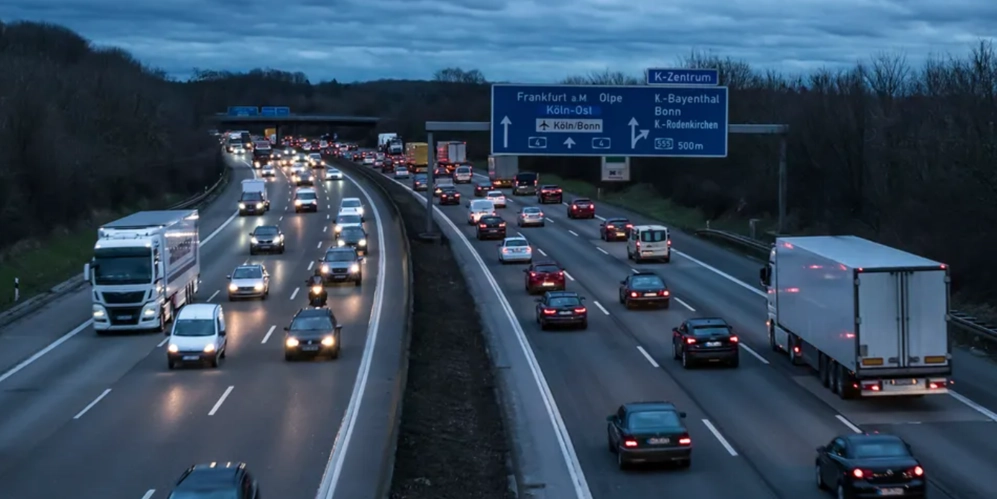The German coalition government has agreed upon a new Climate Protection Law, which shifts from retroactive monitoring of climate targets to a prospective approach over several years and across all sectors.

Federal Minister of Transport, Volker Wissing, stated that the previous law would have been associated with massive restrictions on citizens’ freedom.
“This is a sensible step,” justified the politician in a statement released by the Federal Ministry of Digitalisation and Transport (BMDV).
He emphasized: “With the agreement, traffic bans are finally ruled out.“
This decision was communicated shortly after the Climate Issues Expert Council confirmed that the transport sector had emitted 12.8 million tons of excess CO2 in 2023.
In response to this announcement, the electric and sustainable mobility sector reacted in various ways.
A spokesperson for the German Association of the Automotive Industry (VDA) tells Mobility Portal Europe: “The amendment to the Climate Protection Act rightly shifts the focus to a long-term, cross-sector CO2 reduction target, and thus to a far-sighted strategy.”
And explains: “The fact that this approach is to be strengthened by emissions trading as a future guiding instrument of national and European climate policy is to be viewed positively.”
In this regard, it ensures that strengthening the market-based approach on the path to climate neutrality is key “to remain attractive as a location for investment, innovation, and production.“

In contrast, Transport & Environment (T&E) is concerned about the state’s decision and asserts that it goes against the government’s own scientific advisors.
“By letting the transport sector off the hook, Germany’s climate transition will slow down, risking putting the National car industry at a disadvantage against its international competitors,” says Sebastian Bock, Director of T&E Germany.
Meanwhile, the President of the Central Association of the German Automotive Industry (ZDK), Arne Joswig, expresses as positive that the new law allows moving away from a “narrow sectoral vision.”

However, he emphasizes that electromobility must remain at the center of policy, especially considering the “extreme drop” in the number of electric vehicle (EV) registrations in the first quarter of 2024.
It is noteworthy that this was 22 per cent, which distances Germany from meeting the target of 15 million EVs by 2030.
Also, in dialogue with Mobility Portal Europe, Julia Loder, a researcher on overcoming fossil fuel dependency in a carbon-constrained world for a PhD at the University of St.Gallen, exemplifies:

“We all know that in situations of group work with shared responsibility, maybe some people do less and others have to do more, but that doesn’t mean the work isn’t done in the end and it can still lead to achieving the goal.”
She adds: “It could make it harder, but it could also provide incentives and reduce emissions in the transport sector.”
Germany aims to be carbon neutral by 2045 and to achieve that “action is necessary.”
However, it is important to note that regardless of how the country decides to achieve its goals, it is still committed to meeting the agreed CO2 reduction targets at the European level.
Recently, the European Parliament approved new measures aimed at tightening CO2 reduction targets for heavy-duty vehicles.
These are responsible for over 25 per cent of greenhouse gas emissions from road transport in the European Union (EU) and account for six per cent of total emissions.
Therefore, reducing these emissions is essential to achieve climate neutrality in the EU by 2050 and reduce dependence on imported fossil fuels.
Under the approved regulation, progressive CO2 emission reduction targets are set for trucks and buses.
CO2 emissions from these vehicles are expected to be reduced by 45 per cent for the period 2030-2034, 65 per cent for 2035-2039, and 90 per cent from 2040 onwards.
Furthermore, a significant 90 per cent reduction in emissions from new urban buses is required by 2030, with the aim of achieving emissions neutrality from 2035 onwards.
Reduction targets are also set for trailers and semi-trailers from 2030 onwards.
The European Commission will conduct a detailed review of the effectiveness and impact of the legislation by 2027.
Now, the German federal government will have to define specific climate protection measures for the years 2030 to 2040.
According to government factions, Germany must reduce its CO2 emissions by 88 per cent by 2040.








